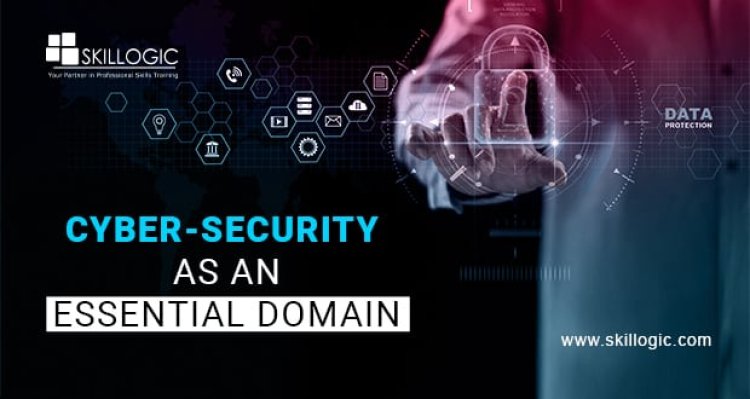Why is Cyber Security Crucial for Your Business?

Cyber-security can be defined as the practice of shielding systems, networks, and programs from digital ambush. The cyberattacks cause ravaging damages to the gauging, switching, or tearing down of sensitive information; extracting money from users; or deferring normal business processes.
Efficient cybersecurity measures should be undertaken as there are more devices than people, and attackers are turning more innovative.
Importance of Cybersecurity
Cyber security is significant because the government, military, corporate, financial, and medical organizations gather, operate, and stock exceptional amounts of data on computers and other devices. A magnitude of that data can be sensitive information such as intellectual property, financial data, personal information across networks, and other devices for business needs.
Here, cyber security is dedicated to safeguarding that data and the systems that are used to operate upon the data or store it. As the magnitude and composure of cyber-attacks pile up, companies and organizations are functioning to protect information relating to national security, health, or financial records that could be easily manipulated by hackers.
Cybersecurity Domains
Critical Infrastructure Security – Critical Infrastructure Security is a practice for guarding the computer systems, networks, and other important resources that society requires for maintaining national security, economic health, and public safety.
Disaster Recovery / Business Continuity Planning – Instruments used for reacting to and answering unplanned events namely natural disasters, power outages, or cybersecurity incidents, without causing any major interruptions to key operations.
Network Security – The actions taken for ensuring the security of a computer network from being under the clasp of intruders who could cause severe damage.
Application Security – Operations to enable applications working on on-premises and in the cloud. Security should be inbuilt into the applications considering how data is handled, user authentication, etc.
Cloud security – Cloud security in preventing theft, leakage, and deletion of vital information by safeguarding the data through cloud computing platforms
Information security – Often shortened as InfoSec, Information Security is the practice of preserving information by reducing chances of information jeopardy.
Gartner insight projected that businesses would spend more than $123 billion on security in 2020 and the figure is expected to grow to $170.4 billion by 2022.
Refer The Article To Know CYBER SECURITY COURSE FEE IN INDIA IN 2022?
What is some harmful software?
Malware
Malware is an abbreviation for malicious software, software purposely designed to inflict damage to a computer, server, client, or computer network. It is highly difficult to locate the presence of malware and it gets away even withstanding any antivirus tools that scan for malicious file attachments.
Ransomware
As the name suggests Ransomware is a type of malware that seals down files, data, or systems thereby hindering users from accessing their system or personal files, and demands a ransom payment in order to the cybercriminals who had initiated the attack. Recent ransomware attacks are also seen targeting the state and local governments.
Phishing
Phishing is a kind of social engineering that hoaxes users into giving their own sensitive information. In phishing scams, emails or texts, messages seem to be from a legitimate source asking for sensitive information, such as credit card data or login information.
Refer The Article To Know Why SKILLOGIC for Cyber Security Courses?
Insider threats
Insider threats are tricky as they stay inconspicuous to traditional security solutions such as firewalls and intrusion detection systems, which concentrate on external threats. Anyone within an organization who abuses their access permissions for devious purposes can cause insider threats.
Distributed denial-of-service (DDoS) attacks In DDoS attacks, cybercriminals would dispatch multiple requests to the infected web resource with the purpose of overpassing the website’s capacity to handle multiple requests and intercepting the website from functioning correctly.
Know The Cyber Security Challenges in the Banking Sector
Advanced persistent threats (APTs) The APT attack is when an unauthorized user captures access to a system or network and stays there for an extended period of time.
Man-in-the-middle attacks
Man-in-the-middle is an attack wherein a cybercriminal intercepts and relays messages between two parties in order to steal data. For example, on an insecure Wi-Fi network, an attacker can intercept data being passed between a guest’s device and the network.
Cybersafety Tips
The internet has evolved into a place infiltrated with malicious links, trojan horses, and viruses. Data breaches have turned into a frequent affair. One wrong click could cost you thousands or even millions. In this scenario, it is inevitable to always remain cautious and safe online.
Some of the tips that you can observe are:
- Do not click recklessly
- Use two-step authentication
- Look out of phishing scams
- Connect securely
- Keep up with updates
- Secure your mobile
- Backup your data
- Practice good password management
- Never leave devices unattended
- Install anti-virus/malware protection
- Be careful on social media
- Avoid unknown sites
Challenges:
The most strenuous problem in cyber security is the continuously growing security risks themselves. The proliferation of cyber attackers and attacking techniques aggravates the problem. Integrating sound cyber security measures with a knowledgeable and security-minded employee base dispenses the best resistance against cybercriminals who strive to get hold of your company’s sensitive data.
Conclusion
Now, if you are intending to step into the world of cyber security, you can acquire Cyber-Security Training from SKILLOGIC that is accredited by EC-Council, IIFIS and NASSCOM and acquire the best training for the same. According to Cybersecurity Ventures, there will be a shortage of 3.5 million cybersecurity specialists on the market by 2021. There are plenty of opportunities out there. Get on board!

0
13314